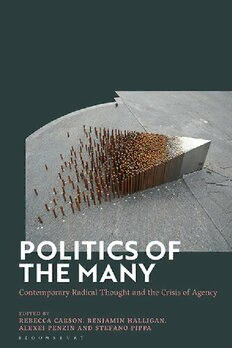
Politics of the Many: Contemporary Radical Thought and the Crisis of Agency PDF
249 Pages·2022·2.688 MB·English
Most books are stored in the elastic cloud where traffic is expensive. For this reason, we have a limit on daily download.
Preview Politics of the Many: Contemporary Radical Thought and the Crisis of Agency
Description:
Since the turn of the millennium, protest movements and strategies have multiplied and diversified; old models of organization involving spokespeople, grand gestures and lobbying, have given way to new approaches. Protests in the 21st century are arranged around collectives as centreless, leaderless, amorphous assemblages.This tendency towards proliferation has been theorized through the concept of multitude, most famously put forward by Michael Hardt and Antonio Negri, which conceptualized a new proletariat for the age of globalization. The idea of multitude primarily sought to revisit and re-energize micro-models of protest, such as radical feminist movements, wildcat strikes, refugee and sex worker rights, hacktivism and reclaiming the streets, squatting and “dropping out”, the “temporary autonomous zone” and occupy. Politics of the Many problematizes the concept of multitude, taking in the substantial criticisms produced in previous decades, and the concept’s testing in the many global upheavals of the last decade, in order to interrogate the ways in which politics and ideology persist in the current moment.
See more
The list of books you might like
Most books are stored in the elastic cloud where traffic is expensive. For this reason, we have a limit on daily download.
